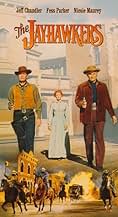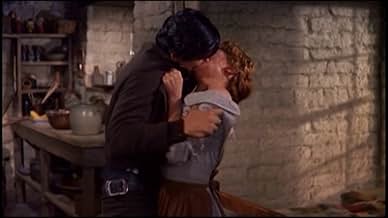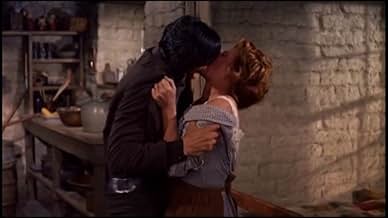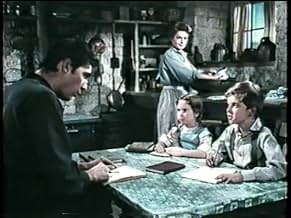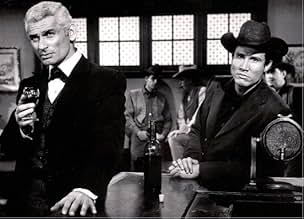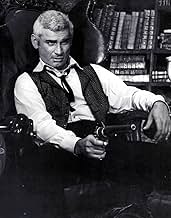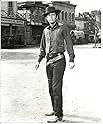NOTE IMDb
6,3/10
805
MA NOTE
Ajouter une intrigue dans votre langueBefore the U.S. Civil War rebel leader Luke Darcy sees himself as leader of a new independent Republic of Kansas but the military governor sends an ex-raider to capture Darcy.Before the U.S. Civil War rebel leader Luke Darcy sees himself as leader of a new independent Republic of Kansas but the military governor sends an ex-raider to capture Darcy.Before the U.S. Civil War rebel leader Luke Darcy sees himself as leader of a new independent Republic of Kansas but the military governor sends an ex-raider to capture Darcy.
- Réalisation
- Scénario
- Casting principal
Al Wyatt Sr.
- Jayhawker
- (as Allan Wyatt)
Avis à la une
If you're going to watch a Jeff Chandler western, this is the one to see. I'd hestitate to call it a masterpiece, but it's a damn good try. Produced and directed by the team of Norman Panama and Melvin Frank, it is a tale of conflicting loyalties, megalomania, love, hate and a number of other issues I can't remember, in pre-Civil War Kansas on the eve of the Civil War. Star Jeff Chandler, who portrays the megalomaniacal but withal personally decent and charismatic bad guy, is quite good here. He had spent a decade in action pictures and romances, with an occasional comedy thrown in for good measure, and yet had not achieved major stardom. A mid-level star of the kind of medium grade movie that was going out of fashion, he was on the verge of becoming an anachronism; and had he not died a couple of years after this film one wonders what would have happened to him and his career. In The Jayhawkers he shows what he might have become: a fine, commanding, aristocratic character actor.
As the second-billed good guy, Fess Parker, fresh from his triumph as Davy Crockett a few years earlier, was attempting a mainstream, post-Disney career. Low-key and phlegmatic, and not without appeal, he lacks the edge of a Mitchum that might have propelled him into the big leagues, and is for the most part an uninteresting hero. Nicole Maurey is the incongruously Gallic love interest, and one can't help be curious as to why she was cast in this film. She was a lovely young woman, but way out of place here.
Loyal Griggs color photography is as good as his work in Shane, and far less mannered. The music of Jerome Moross is stirring and in its way as good as anything Dimitri Tiomkin ever did. With its larger than life good-bad guy, and reasonable (for a movie) historical accuracy, this could have been a major film. The problem with it is that though Panama and Frank were quite good at light comedy, they were inexperienced in the western genre. Frank does a good, derivative job of drawing from Ford and Hawkes; and there are some breathtaking vistas. There is even a touch of Nicholas Ray in his creative and interesting use of interiors, especially the main hideout. And Chandler gives an at times daring performance, with occasional lapses into mild effeminacy in his vocalizing and posture, his work is well-rounded and sophisticated, suggesting that his character's feeling for Parker is more than just friendship. Alas, this daring aspect of the story is never gone into with any depth or insight, and the result the movie is a near-miss, but a fascinating one.
As the second-billed good guy, Fess Parker, fresh from his triumph as Davy Crockett a few years earlier, was attempting a mainstream, post-Disney career. Low-key and phlegmatic, and not without appeal, he lacks the edge of a Mitchum that might have propelled him into the big leagues, and is for the most part an uninteresting hero. Nicole Maurey is the incongruously Gallic love interest, and one can't help be curious as to why she was cast in this film. She was a lovely young woman, but way out of place here.
Loyal Griggs color photography is as good as his work in Shane, and far less mannered. The music of Jerome Moross is stirring and in its way as good as anything Dimitri Tiomkin ever did. With its larger than life good-bad guy, and reasonable (for a movie) historical accuracy, this could have been a major film. The problem with it is that though Panama and Frank were quite good at light comedy, they were inexperienced in the western genre. Frank does a good, derivative job of drawing from Ford and Hawkes; and there are some breathtaking vistas. There is even a touch of Nicholas Ray in his creative and interesting use of interiors, especially the main hideout. And Chandler gives an at times daring performance, with occasional lapses into mild effeminacy in his vocalizing and posture, his work is well-rounded and sophisticated, suggesting that his character's feeling for Parker is more than just friendship. Alas, this daring aspect of the story is never gone into with any depth or insight, and the result the movie is a near-miss, but a fascinating one.
Tightly acted and directed Western with outstanding performances from Jeff Chandler and Fess Parker.
The latter is the conscience, and Parker is terrific as the guiding force who proves effective at carrying out a difficult task while maintaining his humanity in a war-scarred environment. He lifts his screen game from the aw-shucks, King of the Wild Frontier character to legit leading man.
This is the best I've seen from Chandler, always a capable and gifted performer. Here, he holds firm to the ruthless power-monger of his Darcy character while speaking about, and occasionally showing, his human side.
So many Westerns are black versus white, good v. evil. This one gets into the gray areas, actually spends most of its 1:40 run time in the gray. I expected a B-movie, instead saw a solid A effort with a special nod to Melvin Frank, who directed and was part of the writing team.
It's a Western that shakes off the dust and sets down the six-guns, if you dig deep and think about it.
The latter is the conscience, and Parker is terrific as the guiding force who proves effective at carrying out a difficult task while maintaining his humanity in a war-scarred environment. He lifts his screen game from the aw-shucks, King of the Wild Frontier character to legit leading man.
This is the best I've seen from Chandler, always a capable and gifted performer. Here, he holds firm to the ruthless power-monger of his Darcy character while speaking about, and occasionally showing, his human side.
So many Westerns are black versus white, good v. evil. This one gets into the gray areas, actually spends most of its 1:40 run time in the gray. I expected a B-movie, instead saw a solid A effort with a special nod to Melvin Frank, who directed and was part of the writing team.
It's a Western that shakes off the dust and sets down the six-guns, if you dig deep and think about it.
Shortly before the start of the American Civil War rebel Kansas leader Luke Darcy (Jeff Chandler) plans a new independent Republic of Kansas and craving for loot . His vigilante group is called The Jayhawkers and their depredations contributed to the descent of the Missouri-Kansas border region into some of the most vicious guerrilla fighting of the Civil War. Their mission is to end slavery by force but degenerating so completely into a squalid, murderous, slugging match . However, rebel leader Darcy uses The Jayhawkers for his own bid for absolute control of Kansas. Darcy's actions do not sit well with the military governor of Kansas, William Clayton (Herbert Rudley) , as the government command instituted martial law due to "the crime of armed depredations or jay-hawking having reached a height dangerous to the peace and posterity to the whole State (Kansas) and seriously compromising the Union cause in the border counties of Missouri. As William Clayton supposedly wants Darcy captured and brought to justice. For this aim the governor hires an ex-renegade rebel , Cam Bleeker (Fess Parker) , to join Darcy's group and capture their leader . Bleeker has a personal reason for wanting to see Darcy hanged and he's craving for revenge . Darcy was responsible for Bleeker wife's death while Bleeker was in prison .
Exciting film inspired by historical facts set during pre-American Civil War (1861-1865) in which the Jayhackers use guerrilla warfare to destroy targets and led by men set on revenge, invading peaceful towns , making violent raids in Kansas territory . The picture efficiently describes the atmosphere of violence and confrontation among bands and bloody assaults . Stars the known hero Fess Parker-pre Daniel Boone- as the ex-con and an ex-raider whom the military governor sends to capture Darcy well played by Jeff Chandler . Along with this excellent duo there are various notorious actors and familiar faces accompanying them such as : Nicole Maurey , Henry Silva , Herbert Rudley , Frank DeKova , Don Megowan , Leo Gordon , Jack Kruschen , Glen Stange , and Harry Dean Stanton. The motion picture was well directed by Melvin Frank.
The picture was based on historical events , these were the following ones : Jayhawkers and red legs are terms that came to prominence in Kansas Territory, during the Bleeding Kansas period of the 1850s ; they were adopted by militant bands affiliated with the free-state cause during the American Civil War . These gangs were guerrillas who often clashed with pro-slavery groups from Missouri, known at the time in Kansas Territory as "Border Ruffians" or "Bushwhackers." After the Civil War, the word "Jayhawker" became synonymous with the people of Kansas, or anybody born in Kansas. Today a modified version of the term, Jayhawk, is used as a nickname for a native-born Kansan. The meaning of the jayhawker term evolved in the opening year of the American Civil War. When Charles Jennison, one of the territorial-era jayhawkers, was authorized to raise a regiment of cavalry to serve in the Union army, he characterized the unit as the "Independent Kansas Jay-Hawkers" on a recruiting poster. The regiment was officially termed the 7th Regiment Kansas Volunteer Cavalry, but was popularly known as Jennison's Jayhawkers. Thus, the term became associated with Union troops from Kansas. After the regiment was banished from the Missouri-Kansas border in the spring of 1862, it went on to participate in several battles including Union victories of the Battle of Iuka and the Second Battle of Corinth. Late in the war, the regiment returned to Kansas and contributed to Union victory in one of the last major battles in the Missouri-Kansas theater, the Battle of Mine Creek. The Jayhawker term was applied not only to Jennison and his command, but to any Kansas troops engaged in punitive operations against the civilian population of western Missouri, in which the plundering and arson that characterized the territorial struggles were repeated, but on a much larger scale. For example, the term "Jayhawkers" also encompassed Senator Jim Lane and his Kansas Brigade, which sacked and burned Osceola, Missouri. In the first year of the war, much of the movable wealth in western Missouri had been transferred to Kansas, and large swaths of western Missouri had been laid waste, by an assortment of Kansas Jayhawkers ranging from outlaws and independent military bands to rogue federal troops such as Lane's Brigade and Jennison's Jayhawkers. In February 1862, the Union command instituted martial law due to "the crime of armed depredations or jay-hawking having reached a height dangerous to the peace and posterity to the whole State (Kansas) and seriously compromising the Union cause in the border counties of Missouri.
Exciting film inspired by historical facts set during pre-American Civil War (1861-1865) in which the Jayhackers use guerrilla warfare to destroy targets and led by men set on revenge, invading peaceful towns , making violent raids in Kansas territory . The picture efficiently describes the atmosphere of violence and confrontation among bands and bloody assaults . Stars the known hero Fess Parker-pre Daniel Boone- as the ex-con and an ex-raider whom the military governor sends to capture Darcy well played by Jeff Chandler . Along with this excellent duo there are various notorious actors and familiar faces accompanying them such as : Nicole Maurey , Henry Silva , Herbert Rudley , Frank DeKova , Don Megowan , Leo Gordon , Jack Kruschen , Glen Stange , and Harry Dean Stanton. The motion picture was well directed by Melvin Frank.
The picture was based on historical events , these were the following ones : Jayhawkers and red legs are terms that came to prominence in Kansas Territory, during the Bleeding Kansas period of the 1850s ; they were adopted by militant bands affiliated with the free-state cause during the American Civil War . These gangs were guerrillas who often clashed with pro-slavery groups from Missouri, known at the time in Kansas Territory as "Border Ruffians" or "Bushwhackers." After the Civil War, the word "Jayhawker" became synonymous with the people of Kansas, or anybody born in Kansas. Today a modified version of the term, Jayhawk, is used as a nickname for a native-born Kansan. The meaning of the jayhawker term evolved in the opening year of the American Civil War. When Charles Jennison, one of the territorial-era jayhawkers, was authorized to raise a regiment of cavalry to serve in the Union army, he characterized the unit as the "Independent Kansas Jay-Hawkers" on a recruiting poster. The regiment was officially termed the 7th Regiment Kansas Volunteer Cavalry, but was popularly known as Jennison's Jayhawkers. Thus, the term became associated with Union troops from Kansas. After the regiment was banished from the Missouri-Kansas border in the spring of 1862, it went on to participate in several battles including Union victories of the Battle of Iuka and the Second Battle of Corinth. Late in the war, the regiment returned to Kansas and contributed to Union victory in one of the last major battles in the Missouri-Kansas theater, the Battle of Mine Creek. The Jayhawker term was applied not only to Jennison and his command, but to any Kansas troops engaged in punitive operations against the civilian population of western Missouri, in which the plundering and arson that characterized the territorial struggles were repeated, but on a much larger scale. For example, the term "Jayhawkers" also encompassed Senator Jim Lane and his Kansas Brigade, which sacked and burned Osceola, Missouri. In the first year of the war, much of the movable wealth in western Missouri had been transferred to Kansas, and large swaths of western Missouri had been laid waste, by an assortment of Kansas Jayhawkers ranging from outlaws and independent military bands to rogue federal troops such as Lane's Brigade and Jennison's Jayhawkers. In February 1862, the Union command instituted martial law due to "the crime of armed depredations or jay-hawking having reached a height dangerous to the peace and posterity to the whole State (Kansas) and seriously compromising the Union cause in the border counties of Missouri.
There is a French touch in this western which is closer to a political fable than to the usual stuff.Besides,the family Parker meets is French ,which is very rare in the genre.
Jeanne Dubois tells him so :"we came in America ,because we were in search of liberty";if the movie takes place at the end of the Civil War,then it was still )Napoleon (the Third , the nephew of Bonaparte)who was ruling the country (1848-1870);it was a dictatorship that led the country to war with Prussia / Germany (with disastrous consequences later in the twentieth century).Hence Jeanne's remark ,even though she does not hint at both emperors at all.
On the other hand ,Luke Darcy admires Napoleon (the First),with his inflated ego;it's not a cardboard character though ;he is a true demagogue,like far-right wing leaders ,he promises lots of things (schools ,hospitals),he's perhaps convinced he works for the greater good of his future subjects ,for he has an empire in mind ;and yet he remains deaf to the father's plea .As for Parker's wife ,her fate remains ambiguous ;as is his relationship with his enemy who reminds him of his own brother.
In spite of some implausibilities (the little girl survives the stampede),the story is not that simple .
A note about Nicole Maurey ,who recently passed away:she began her career with a masterpiece ("Journal D'Un Curé De Campagne " aka "diary of a country priest" by Robert Bresson) ,then continued to work in her native country ("Action Immédiate" )and in the US ('secret of the incas" opposite Charlton Heston.);but trying to do too many things at once ,she never became a true star in both countries.
Henry Silva ,who plays a supporting part in "the jayhawkers" ,enjoyed a career in Europa (mainly in Italy) in the seventies .
Jeanne Dubois tells him so :"we came in America ,because we were in search of liberty";if the movie takes place at the end of the Civil War,then it was still )Napoleon (the Third , the nephew of Bonaparte)who was ruling the country (1848-1870);it was a dictatorship that led the country to war with Prussia / Germany (with disastrous consequences later in the twentieth century).Hence Jeanne's remark ,even though she does not hint at both emperors at all.
On the other hand ,Luke Darcy admires Napoleon (the First),with his inflated ego;it's not a cardboard character though ;he is a true demagogue,like far-right wing leaders ,he promises lots of things (schools ,hospitals),he's perhaps convinced he works for the greater good of his future subjects ,for he has an empire in mind ;and yet he remains deaf to the father's plea .As for Parker's wife ,her fate remains ambiguous ;as is his relationship with his enemy who reminds him of his own brother.
In spite of some implausibilities (the little girl survives the stampede),the story is not that simple .
A note about Nicole Maurey ,who recently passed away:she began her career with a masterpiece ("Journal D'Un Curé De Campagne " aka "diary of a country priest" by Robert Bresson) ,then continued to work in her native country ("Action Immédiate" )and in the US ('secret of the incas" opposite Charlton Heston.);but trying to do too many things at once ,she never became a true star in both countries.
Henry Silva ,who plays a supporting part in "the jayhawkers" ,enjoyed a career in Europa (mainly in Italy) in the seventies .
Plot-- An ex-renegade (Parker) agrees to infiltrate a renegade band in return for a pardon from the feds. Then too, he's got a personal grudge against the band's leader (Chandler) for victimizing his wife and their farm. Trouble is the leader is kind of a likable guy. So which way will the ex-renegade go.
Somewhere inside all the turgid talk is a good story of conflict between Parker's emotions and his principles. Trouble is the studio (Paramount) appears more interested in playing up the three leads than in the story itself. Thus we get a ton of talky scenes with some combination of Parker, Chandler, and Aubert instead of action or suspense. So western fans may feel cheated in the action department. I suspect four scriptwriters working on the same screenplay have something to do with that. Then too, the direction (Frank) is pretty flat. In fact, the director's resume (IMDB) appears more at home with fluff than outdoor drama. It's noteworthy too that the locations never leave greater LA, so we're also short in the scenic department. That's especially unfortunate since the film needs some sweep to match the story's scale. After all, the script is playing with the disposition of an entire state, Kansas. On the other hand, Paramount did pop for an army of extras to fill out the mustering scenes.
I winced at one point where Chandler says life is short, or words to that effect. Tragically, Chandler himself would die two years later as a result of medical malpractice. So his words here seem more than just a little prophetic. Too bad the menacing Henry Silva is largely wasted in a routine role. Some close-ups of his sinister sneer would have added needed dramatic impact. All in all, the movie's a turgid disappointment despite a capable cast, a good core conflict, and big screen VistaVision.
Somewhere inside all the turgid talk is a good story of conflict between Parker's emotions and his principles. Trouble is the studio (Paramount) appears more interested in playing up the three leads than in the story itself. Thus we get a ton of talky scenes with some combination of Parker, Chandler, and Aubert instead of action or suspense. So western fans may feel cheated in the action department. I suspect four scriptwriters working on the same screenplay have something to do with that. Then too, the direction (Frank) is pretty flat. In fact, the director's resume (IMDB) appears more at home with fluff than outdoor drama. It's noteworthy too that the locations never leave greater LA, so we're also short in the scenic department. That's especially unfortunate since the film needs some sweep to match the story's scale. After all, the script is playing with the disposition of an entire state, Kansas. On the other hand, Paramount did pop for an army of extras to fill out the mustering scenes.
I winced at one point where Chandler says life is short, or words to that effect. Tragically, Chandler himself would die two years later as a result of medical malpractice. So his words here seem more than just a little prophetic. Too bad the menacing Henry Silva is largely wasted in a routine role. Some close-ups of his sinister sneer would have added needed dramatic impact. All in all, the movie's a turgid disappointment despite a capable cast, a good core conflict, and big screen VistaVision.
Le saviez-vous
- AnecdotesThe theme for TV's La grande caravane (1957) was taken directly from the Jerome Moross score of this film when Moross worked on the western series.
- GaffesTopeka is referred to as the Capitol of Kansas, during the time period depicted in the film, prior to the Civil War, the capitol of the Kansas Territory was actually Lecompton.
- Citations
Luke Darcy: I've got what I want. I've got Kansas.
- ConnexionsReferenced in Mission impossible: The Mind of Stefan Miklos (1969)
Meilleurs choix
Connectez-vous pour évaluer et suivre la liste de favoris afin de recevoir des recommandations personnalisées
- How long is The Jayhawkers!?Alimenté par Alexa
Détails
- Durée
- 1h 40min(100 min)
- Rapport de forme
- 1.85 : 1
Contribuer à cette page
Suggérer une modification ou ajouter du contenu manquant

